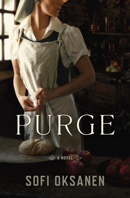
Estonia 1992, right after the fall of the Soviet Union, is a turbulent place, even in a small village far off the centre of events. The old woman Aliide is waiting for the legal rights to her family's lands and forests, once claimed for collective farming, to be returned to her. Hopefully it'll be before the Finnish foresting companies that are moving in fast cut it anyway—without paying. And yet, this is far from the biggest of her worries. For Aliide is labelled a communist collaborator and Russian-lover, and in this new state there is no one to protect her. The local youth are shouting hate and scorn outside her house at night, and she fears that any night now, they will bring cans of petrol with them.
So it's no wonder Aliide is suspicious when one morning she finds the young woman Zara huddling on her front porch. Is she a decoy, a spy, a thief? Why would she, clearly a Russian girl, speak such an old-fashioned kind of Estonian? The sad truth is that Zara is a victim of the new times. She is from Vladivostok, and is a long way from home. Having been drawn into a trafficking scam, she is now on the run from her slavers. But it's also soon evident that her coming to this particular farm house is no coincidence. Zara is tightly connected to Aliide's dark and hidden past—her hopeless and blinding love for her sister's husband, a member of the hunted nationalist resistance, and the chain of betrayals set in motion by her desire to be close to him. Aliide's story is one of moral corruption, self deception, sacrifices, double loyalties and—ultimately—about costs much too high.
Purge is the third book by Sofi Oksanen, a young Finnish writer born of a Finnish father and an Estonian mother. It has been a big success in Scandinavia, and it has been Oksanen's public breakthrough, especially since the novel was awarded the Nordic Council's prize for literature earlier this year. The Estonian heritage is central in Oksanen's authorship, as is a strong feminist viewpoint, and she often seems to let present and past stand in a commentary relation to one another. Very much so in this case, as the book jumps between the stories of the two women, back and forth in time, creating a puzzle that comes together only slowly and gradually. It's a read that demands some concentration, but it is also exciting and rewarding, with a nice balance between character, situation and plot. The Estonian landscape is so vividly described I can almost taste and smell it, as can I the drab, grey paranoia of the Stalinist times.
A flaw of the book is that the two main storylines are pretty unbalanced. Zara's story, while heart-wrenching, very graphic and often disturbing, doesn't match Aliide's in complexity or originality. Worse, in all its explicit horror, you kind of feel you've it read before—it's "just another story about trafficking" to put it bluntly. But to me, since the storylines mirror each other thematically, they draw emotional impact from each other. Both women's stories deal with oppression under different systems, with captivity, the helplessness in not having legal documents, trying to play by the rules in a game you can't win, the corruption of ideals, the shame in being abused—to mention but a few overlaps. Oksanen used the same technique in her debut novel Stalinin lehmät (Stalin's Cows), by letting the starvation of the people during the early communist era contrast with young western women's anorexia of today, but in Purge the weave is so much more intricate.
The ending of the book is somewhat stressed and blunt, but that almost becomes a quality in itself, especially in relation
to the concluding string of documents and letters which add some final pieces to this fifty year puzzle. Purge is
not a book completely without flaws, but it's original, moving and it has something to say. It reads like a thriller,
while giving insight on both a time and a place that many know much too little about. And, honestly, how often can you say that?

Black Cat, paperback, 9780802170774
Atlantic Books, paperback, 9781848872110
